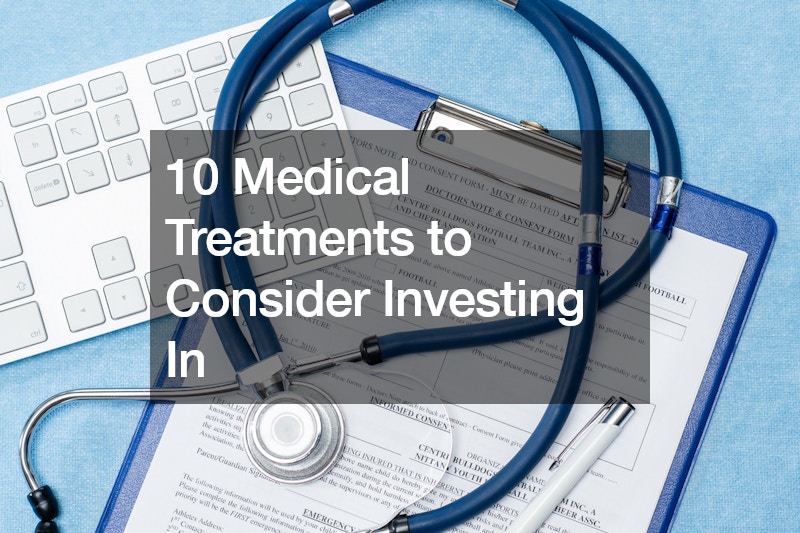
We seek the best options when caring for ourselves and our loved ones. Have you checked medical treatments to consider investing in? Plan for the future and save in the long run. Explore medical fields like orthodontics, dentistry, workers’ compensation, and eco-friendly healthcare. Discover promising investment opportunities and why they matter. Get ready for an enlightening journey with a cup of coffee!
1. Exploring the World of Dental Alignment

Now, let’s dive into the world of orthodontics. When we talk about medical treatments to consider, orthodontics often comes to mind. After all, who doesn’t want a perfect smile? But it’s not just about aesthetics. An orthodontist plays a crucial role in diagnosing and treating dental issues such as misaligned teeth and jaws, overbites, and underbites.
Orthodontic treatments aren’t only for teenagers with braces anymore, either. They’re becoming increasingly popular among adults seeking to improve their oral health and self-confidence. With technological advances, there are now various treatment options: traditional braces, clear aligners, lingual braces—you name it! Each offers benefits and can be tailored to the patient’s needs and lifestyle.
But remember, investing in orthodontics isn’t just picking the most expensive treatment. It’s about understanding what you or your loved ones need and finding an orthodontist you trust. After all, these treatments can be a significant financial commitment, so making an informed decision is key.
2. Addressing Misaligned Smiles

Moving on from orthodontics, let’s focus on one specific issue that many folks grapple with— crooked teeth. Crooked teeth are a common dental problem affecting your appearance and oral health. But don’t fret—there’s good news! Modern dentistry has provided us with numerous medical treatments to consider for this issue.
Nowadays, dealing with crooked teeth isn’t as daunting as it used to be. There are various options available that can help straighten your smile and boost your confidence. Let’s start with the most well-known solution – braces. They’re not just for kids anymore. Adults are increasingly turning to this tried-and-true method to correct their misaligned teeth.
Invisible aligners have also become a popular choice. They’re less noticeable than traditional braces and can be removed when eating or brushing your teeth. How’s that for convenience?
But what if you’re looking for something a bit more permanent? Porcelain veneers could be the way to go. They’re thin, custom-made shells to fit over your teeth, creating a straight, white smile built to last. And then there’s accelerated orthodontics, a newer treatment that uses special techniques to speed up straightening teeth. It’s a little more expensive, but time is money, right?
3. Understanding the Role of Legal Professionals in Healthcare
Shifting gears from dental matters, let’s delve into a different aspect of healthcare – the legal side. Specifically, let’s talk about the role of Social Security Disability Insurance (SSDI) attorneys. You might wonder, ‘What do SSDI attorneys have to do with medical treatments to consider?’ Well, quite a lot.
First, what is SSDI? The program provides financial assistance to people who cannot work due to a disability. And where does an SSDI attorney come in? They help you navigate the complex process of applying for these benefits.
You might think, ‘I can handle the paperwork myself.’ But here’s the thing. The process can be overwhelming, and having a local SSDI attorney on your side can significantly increase your chances of getting approved.
But their role doesn’t stop there. An SSDI attorney can also help you understand how receiving these benefits could affect your access to medical treatments. For instance, they can explain how financial assistance from SSDI can make certain treatments more accessible. Furthermore, they can guide you through the appeals process if your application gets denied. And if your case goes to court, they’ll be right there, advocating for your rights.
4. The Intersection of Medical Treatments and Employment
Continuing on the legal side of healthcare, let’s look at another critical area – workers’ compensation. Now, you may be asking, ‘How does this tie in with medical treatments to consider?’ If you’ve been injured on the job, understanding workers’ compensation can be vital in accessing the care you need.
Workers’ compensation is insurance that provides wage replacement and medical benefits to employees injured during employment. Sounds straightforward, right? However, claiming these benefits can be anything but simple. That’s where workers compensation lawyers come in.
These legal professionals specialize in the laws and regulations surrounding workers’ compensation. They can guide you through the process, ensuring your rights are protected every step of the way. If your employer denies or disputes your claim, they’re there to fight for you.
But their role goes beyond just handling the legal paperwork. Workers’ compensation lawyers can also help you understand the medical treatments available under your benefits. They can explain what treatments are covered, how to access them, and how to navigate any hurdles that might arise.
For instance, if you need physical therapy or surgery because of your workplace injury, your lawyer can help ensure these treatments are included in your compensation. They can also advise you on dealing with any disputes with the insurance company over your treatment plan.
5. The Rise of Non-Surgical Cosmetic Procedures

Switching gears from legal aspects, let’s delve into a rising trend in the healthcare world – non-surgical cosmetic procedures. If you’re seeking ways to enhance your appearance without going under the knife, these treatments are medical treatments to consider.
One of the most popular non-surgical treatments is Botox. It’s a quick procedure that can smooth wrinkles and fine lines, giving you a youthful look. And the best part? No downtime is required.
Then there’s dermal fillers. These filler treatments can add volume to areas like your lips or cheeks, create sharper facial contours, or even reduce the appearance of scars. The results can be dramatic, but the process is minimally invasive.
Chemical peels are another go-to option. They can help reduce signs of aging, brighten your complexion, and even address issues like acne or hyperpigmentation. And while the idea of ‘peeling’ might sound scary, many peels are gentle and require little to no recovery time.
Last but not least, there’s laser treatment. From hair removal to skin rejuvenation, lasers offer a range of solutions for various cosmetic concerns. They’re precise, effective, and often quicker than traditional methods.
6. Ensuring Oral Health: The Importance of Regular Check-ups
Let’s circle back to traditional healthcare concerns moving on from cosmetic enhancements. One aspect that can’t be overlooked is oral health. When discussing medical treatments, regular dental check-ups should top the list.
People often consider dental care a reactive measure—something you seek when there’s pain or a visible problem. But in reality, it’s a proactive endeavor. Regular check-ups are vital for maintaining good oral health and catching potential issues early.
Imagine you’re brushing your teeth and notice a small spot on your tooth. It doesn’t hurt, so you ignore it. Months later, you’re in the dentist’s chair with a cavity that needs filling. If you had gone for a routine check-up when you first noticed the spot, the dentist might have been able to treat it with a simple fluoride treatment or recommend better brushing techniques.
And it’s not just about cavities. Regular dental visits can also help detect more serious conditions like gum disease or oral cancer. The earlier these conditions are detected, the better the chances of successful treatment.
So, what does a typical check-up involve? Usually, your dentist will examine your teeth and gums, clean any plaque or tartar build-up, and take x-rays if necessary. They’ll also discuss your overall health and any changes you’ve noticed, as many health conditions can manifest symptoms in your mouth.
7. The Comprehensive Guide to Family Dentistry

Building on the importance of regular dental check-ups, let’s delve into an area that benefits everyone – family dentistry. If you’ve got a household to look after, family dental care should be one of your top medical treatments to consider.
A family dentist is a jack-of-all-trades in the dental world. They cater to patients of all ages, from your toddler getting their first tooth to your grandma needing dentures. This comprehensive approach simplifies dental care and fosters a more personalized experience.
Firstly, having a family dentist means convenience. Instead of juggling multiple appointments at different clinics, you can schedule back-to-back visits for the whole family. It’s a time-saver and a stress reliever, especially for busy parents.
Secondly, a family dentist builds relationships with your family. They’ll know your family’s dental history, habits, and concerns. This familiarity allows them to provide more tailored care and advice. For example, if a genetic oral issue runs in your family, they’ll look for early signs in your children.
Thirdly, family dentists offer a wide range of services. They’ve covered you from routine cleanings to braces, fillings, and crowns. Some even offer cosmetic procedures like whitening or veneers. So, no matter your family’s dental needs, a family dentist can handle it.
Lastly, a family dentist is key in educating your family about oral hygiene. They can teach your kids about proper brushing techniques, explain the importance of flossing to your teenager, and advise you on gum health as you age.
8. Revolutionizing Smile Restorations
Transitioning from family dentistry, let’s delve into a specific area of dental care that’s revolutionizing smile restorations – denture services. If you’re missing teeth or know someone who is, denture services should be on your list of medical treatments to consider. Dentures have come a long way since the days of wooden teeth. Today’s versions are more comfortable, natural-looking, and functional than ever. They can restore your smile and your ability to eat and speak properly.
First off, there are different types of dentures. Complete dentures replace all teeth, while partial ones fill in gaps when some natural teeth remain. Your dentist will guide you in choosing what’s best for your situation.
Then there’s the matter of materials. Gone are the days of one-size-fits-all dentures. Modern ones are custom-made using impressions of your mouth to ensure a perfect fit. They’re often made from acrylic resin or other durable materials that look and feel like real teeth.
And let’s not forget about implant-supported dentures. These are anchored to dental implants, providing superior stability. They won’t slip or shift in your mouth, a common complaint with traditional dentures. While they require a more complex procedure, many find the benefits outweigh the drawbacks.
Of course, getting dentures is not a one-and-done deal. Regular check-ups are crucial to ensure they continue to fit well and function correctly. Your dentist can also provide maintenance tips to prolong the life of your dentures.
9. Understanding the Importance of Physical Examinations for Drivers
Shifting gears from dental care, let’s steer the conversation towards a different kind of health check – DOT physicals. If you’re a commercial driver or aiming to become one, DOT physicals should be a priority on the medical treatments to consider. So, what’s a DOT physical?
It’s a health exam required by the Department of Transportation for commercial drivers to ensure they’re fit to drive safely. The exam covers vision, hearing, blood pressure, heart rate, diabetes, and other conditions affecting driving ability. DOT physicals are tailored for commercial driving needs, emphasizing vision tests for depth perception and peripheral vision. Passing a DOT physical is essential for getting or renewing a commercial driver’s license and enhances road safety by detecting potential health issues.
10. Investing in Green Healthcare
Steering away from the conventional, let’s explore an unconventional approach to healthcare that’s gaining traction: investing in green healthcare through tree planting. Given the wide array of medical treatments to consider, you might ask, ‘Where does tree planting fit in?’
Trees do more than just beautify – they impact our health significantly. Green spaces improve wellness by absorbing pollutants, emitting oxygen, and enhancing air quality, benefitting respiratory health. Exposure to nature reduces stress, anxiety, and depression, supporting mental well-being. Trees also promote physical activity and combat urban heat, contributing to overall health.
The medical treatments to consider for investments are wide-ranging. There are diverse opportunities, from traditional healthcare stocks to innovative research, including unique approaches like tree planting for green healthcare. Investing goes beyond finances to support advancements that improve and save lives. Whether you’re an experienced investor or a medical professional seeking impact, every dollar invested contributes to better health. Explore these exciting prospects; your investment might spark the next healthcare breakthrough.



